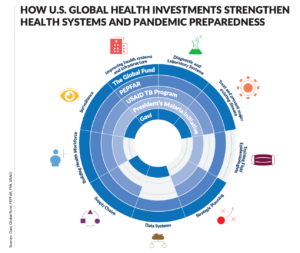Member Spotlight: Friends of the Global Fight
In the Shadow of COVID-19, the Fight Against AIDS, TB and Malaria Continues
By Berk Ehrmantraut, Senior Digital Communications Manager, Friends of the Global Fight

Over the past year, COVID-19 has transformed the world. From our work routines and travel to our ability to see friends and family, no aspect of our lives has gone untouched. Every industry and institution has felt the ripple effects of this deadly infectious disease and our efforts to counter it. Wednesday, March 24 will be our second World TB Day in the shadow of this new pandemic, and nowhere has COVID-19’s impact been clearer than in the global response to AIDS, tuberculosis (TB) and malaria.
In communities hit hard by COVID-19, healthcare facilities and workers have been overwhelmed responding to this new pandemic and pre-existing infectious diseases at the same time. Even in communities that have not seen high COVID-19 infection rates, lockdowns and supply chain disruptions have impacted AIDS, TB and malaria responses.
As Robin Blades reported in Undark, disruptions caused by COVID-19 in Peru have set back progress against TB. As lockdowns were implemented to stop the spread of COVID-19 and people concerned about COVID-19 avoided healthcare facilities, diagnosis and treatment of TB dropped, allowing infections to grow in the shadow of the coronavirus pandemic.
Unfortunately, Peru’s experience isn’t unique – many countries are experiencing similar disruptions to their AIDS, TB and malaria programming. The Global Fund to Fight AIDS, Tuberculosis and Malaria conducts a bi-weekly survey of service delivery disruptions in countries where it invests, and the impact of COVID-19 is clear: 66% of countries are experiencing moderate to high HIV service delivery disruption, with 56% experiencing that for TB and 50% for malaria.
For HIV, disruptions can include difficulty picking up life-saving antiretroviral therapy medications due to lockdowns and additional barriers to accessing prevention services, among other challenges, as Global Health Council’s HIV Brief explains.
As COVID-19 disrupts these essential programs, the United States has a crucial role to play as it re-emerges as a global health leader. The President’s Emergency Plan For AIDS Relief (PEPFAR), the President’s Malaria Initiative (PMI) and the United States Agency for International Development (USAID) TB program are working to adapt responses in the context of COVID-19.
As new PMI head Dr. Raj Panjabi recently told NPR, “Just because COVID is infecting so many people doesn’t mean the malaria disease burden has gotten any less. It’s gotten worse because COVID has disrupted health care systems dramatically and that has put the strain on health workers and clinics, disrupted supply chains as well. We need to make sure nets and malaria tests and treatments get to people.”
Increased investments in our bilateral programs to fight AIDS, TB and malaria are needed to prevent setbacks from COVID-19. The U.S. has a decades-long history of global health leadership. Now is the time to protect that progress and investment and push to end the AIDS, TB and malaria epidemics around the world.
To learn more about how COVID-19 is affecting the global response to AIDS, TB and malaria, visit theglobalfight.org/covid-aids-tb-malaria.
About Friends of the Global Fight
Friends of the Global Fight Against AIDS, Tuberculosis and Malaria advocates for U.S. support of the Global Fund and the goal to end the epidemics of AIDS, TB and malaria. For more information about Friends of the Global Fight, visit www.theglobalfight.org.